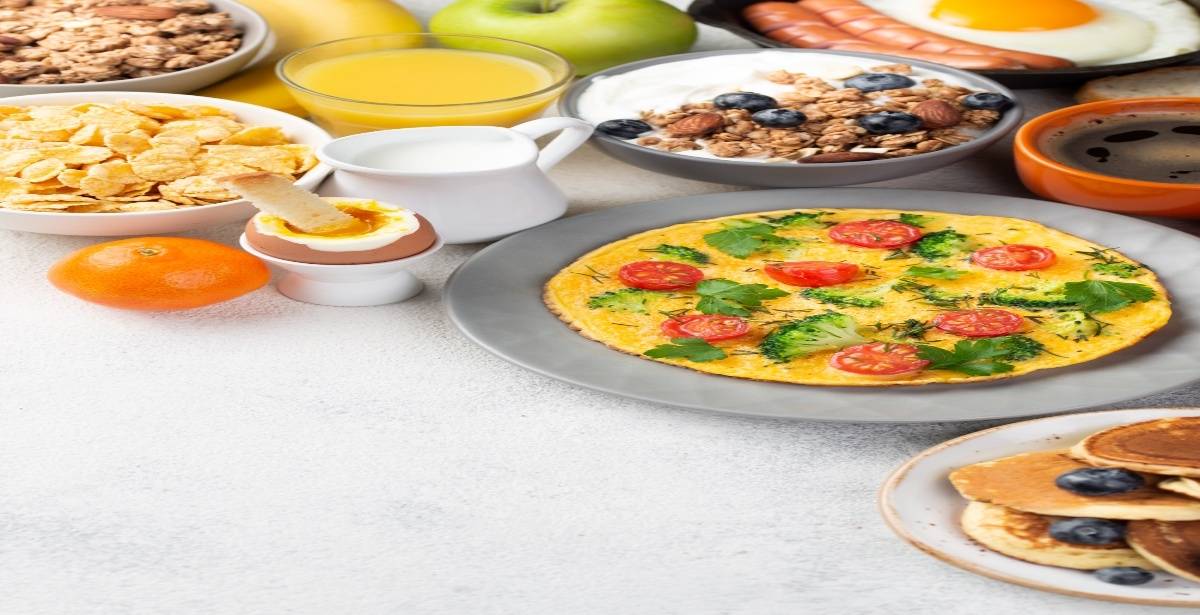Healthy, balanced, and nourishing—pregnancy is when your body needs extra nutrients and energy. Finding easy, nutrient-rich breakfast ideas can make all the difference in your day. You might not be a fan of eating raw spinach or paneer, since they can taste a bit bland on their own. But when you mix them into tasty dishes, they become much more enjoyable and still pack all their benefits.
These delicious nutrient-rich breakfast recipes will help you start each morning with meals that satisfy your cravings and support both your health and your baby’s growth.
Why A Nutrient-Rich Breakfast Is Essential For Moms-To-Be
Starting your day with a nutrient-rich breakfast is crucial during pregnancy for several reasons:
- Supports baby’s development: Key nutrients like iron, calcium, folic acid, and omega-3 fatty acids are essential for your baby’s growth.
- Boosts energy levels: A balanced breakfast helps maintain steady energy levels, which is especially important during pregnancy.
- Manages pregnancy symptoms: Eating well can help with common pregnancy issues like morning sickness, constipation, and fatigue.
- Promotes healthy weight gain: A nutrient-rich breakfast can help you manage your appetite and maintain a healthy weight throughout pregnancy.
Now, let’s dive into some easy-to-make, nutrient-rich breakfast recipes that are perfect for moms-to-be.
Best Healthy Breakfast Ideas For Pregnant Women
While you always cook healthy recipes for kids, now is the time to focus on your own nutrition—this will benefit both you and your baby.
1. Masala Oats with Vegetables
Spicy and hearty oats mixed with fresh vegetables for a fiber-rich, filling breakfast.
Why It’s Nutrient-Rich
- Fiber: Oats are rich in fiber, which helps with digestion.
- Iron: Oats also contain iron, important for preventing anemia during pregnancy.
- Vitamins: Vegetables like carrots, peas, and tomatoes add vitamins and minerals.
How to Make Masala Oats
Ingredients
- 1 cup rolled oats
- 1 small onion, finely chopped
- 1 small tomato, chopped
- 1 carrot, diced
- A handful of green peas
- 1/2 tsp turmeric powder
- 1/2 tsp cumin seeds
- 1/2 tsp garam masala
- Salt to taste
- 2 cups water
- 1 tbsp oil
Method
- Heat oil in a pan and add cumin seeds. Let them splutter.
- Add chopped onions and sauté until golden brown.
- Add tomatoes, carrots, and peas, and cook for a few minutes.
- Add turmeric powder, salt, and garam masala. Mix well.
- Add oats and water. Stir and cook for about 5-7 minutes until the oats are soft and the mixture thickens.
- Serve hot, garnished with fresh coriander leaves.
2. Moong Dal Cheela with Paneer Filling
Savory lentil pancakes stuffed with protein-packed paneer and spinach.
Why It’s Nutrient-Rich
- Protein: Moong dal and paneer are excellent sources of protein, essential for tissue repair and growth.
- Calcium: Paneer adds a good amount of calcium, important for your baby’s bone development.
- Folic Acid: Moong dal is rich in folic acid, crucial for preventing birth defects.
How to Make Moong Dal Chilla
Ingredients
- 1 cup yellow moong dal (split yellow lentils), soaked for 2 hours
- 1 small onion, finely chopped
- 1 green chili, chopped
- 1/4 tsp turmeric powder
- Salt to taste
- 100g paneer, crumbled
- Fresh coriander leaves, chopped
- 1 tsp oil for cooking each cheela
Method
- Drain the soaked moong dal and grind it to a smooth batter with a little water.
- Add chopped onion, green chili, turmeric powder, and salt to the batter. Mix well.
- Heat a non-stick pan and pour a ladle of batter, spreading it thinly like a dosa.
- Drizzle some oil around the edges and cook on medium heat until golden.
- Flip and cook the other side for a minute.
- Place crumbled paneer mixed with chopped coriander on one side of the cheela and fold it.
- Serve hot with green chutney.
3. Upma with Mixed Vegetables
Flavorful semolina dish with mixed veggies, perfect for a quick and nutritious start to your day.
Why It’s Nutrient-Rich
- Fiber: Semolina (suji) and vegetables add fiber, aiding digestion.
- Vitamins and Minerals: Vegetables like carrots, beans, and peas provide essential vitamins.
- Healthy Fats: Cooking with a little ghee adds healthy fats that are good for both mom and baby.
How to Make Upma
Ingredients
- 1 cup semolina (suji)
- 1 small onion, chopped
- 1 small tomato, chopped
- 1 carrot, diced
- A handful of green peas and beans
- 1/2 tsp mustard seeds
- 1/2 tsp urad dal
- A few curry leaves
- 1 green chili, chopped
- 1 tbsp ghee or oil
- 2 cups water
- Salt to taste
Method
- Dry roast semolina in a pan until it turns light golden and aromatic. Keep aside.
- Heat ghee in a pan and add mustard seeds. When they crackle, add urad dal and curry leaves.
- Add chopped onions and green chili. Sauté until onions are translucent.
- Add chopped tomatoes, carrots, peas, and beans. Cook for a few minutes.
- Add water and salt. Bring to a boil.
- Gradually add roasted semolina, stirring continuously to avoid lumps.
- Cook on low heat for 5-7 minutes until the upma thickens.
- Serve hot, garnished with fresh coriander leaves.
4. Paneer and Spinach Paratha
Soft, whole wheat flatbreads filled with creamy paneer and iron-rich spinach.
Why It’s Nutrient-Rich
- Iron: Spinach is rich in iron, essential for preventing anemia.
- Calcium and Protein: Paneer provides calcium and protein, supporting baby’s bone development.
- Folic Acid: Spinach is also a good source of folic acid, important for fetal development.
How to Make Paneer and Spinach Paratha
Ingredients
- 1 cup whole wheat flour
- 100g paneer, grated
- 1/2 cup spinach, finely chopped
- 1 small onion, finely chopped
- 1/2 tsp cumin seeds
- 1/2 tsp garam masala
- Salt to taste
- Water as needed for dough
- Ghee for cooking
Method
- Mix whole wheat flour with water and a pinch of salt to make a soft dough. Keep aside.
- In a bowl, mix grated paneer, chopped spinach, onion, cumin seeds, garam masala, and salt.
- Divide the dough into small balls. Roll out each ball into a small circle.
- Place a spoonful of the paneer-spinach mixture in the center and fold the edges to seal.
- Gently roll out the stuffed dough into a paratha.
- Heat a tawa and cook the paratha on both sides with a little ghee until golden brown.
- Serve hot with curd or pickle.
5. Ragi Porridge with Milk and Jaggery
Nutritious ragi porridge sweetened with jaggery, offering calcium and iron in every bite.
Why It’s Nutrient-Rich
- Calcium: Ragi is an excellent source of calcium, important for strong bones.
- Iron: Ragi also provides iron, essential for preventing anemia.
- Natural Sweetener: Jaggery adds sweetness along with minerals like iron.
How to Make Ragi Porridge
Ingredients
- 1/2 cup ragi flour
- 2 cups milk (or water for a lighter version)
- 2 tbsp jaggery (adjust to taste)
- 1/4 tsp cardamom powder
Method
- Mix ragi flour with a little water to make a smooth paste.
- Boil milk or water in a pan and add the ragi paste, stirring continuously to avoid lumps.
- Cook on low heat for about 5-7 minutes until the mixture thickens.
- Add jaggery and cardamom powder. Stir well until the jaggery dissolves.
- Serve warm, garnished with nuts or fruits if desired.
6. Poha with Vegetables and Peanuts
Light and crunchy flattened rice cooked with vegetables and crunchy peanuts for added protein.
Why It’s Nutrient-Rich
- Iron: Flattened rice (poha) is rich in iron, important for maintaining healthy hemoglobin levels.
- Fiber and Vitamins: Adding vegetables like carrots, peas, and potatoes enhances the fiber and vitamin content.
- Healthy Fats: Peanuts add healthy fats and protein.
How to Make Poha
Ingredients
- 1 cup poha (flattened rice)
- 1 small onion, chopped
- 1 small potato, diced
- 1 small carrot, diced
- A handful of green peas
- 1/2 tsp mustard seeds
- A few curry leaves
- 1 green chili, chopped
- 2 tbsp peanuts
- 1 tbsp oil
- Salt to taste
- Lemon juice and fresh coriander for garnish
Method
- Rinse poha in a sieve under running water. Drain and keep aside.
- Heat oil in a pan and add mustard seeds. When they splutter, add curry leaves, green chili, and peanuts.
- Add chopped onions and sauté until they turn soft.
- Add diced potatoes, carrots, and peas. Cook until the vegetables are tender.
- Add the drained poha and salt. Mix well and cook for 2-3 minutes.
- Turn off the heat and add a squeeze of lemon juice.
- Garnish with fresh coriander leaves and serve hot.
Conclusion
Eating a nutrient-rich breakfast is one of the best ways to support your pregnancy journey. With these simple and delicious breakfast recipes, you can ensure that you and your baby receive the essential nutrients needed for a healthy and happy pregnancy. Whether it’s the fiber-rich masala oats or the protein-packed moong dal cheela, these dishes are easy to make and perfect for busy mornings. So, why not try these recipes and start your day on a healthy note?
Remember, variety is key, so mix and match these breakfast ideas to keep your meals interesting and full of nutrients!




